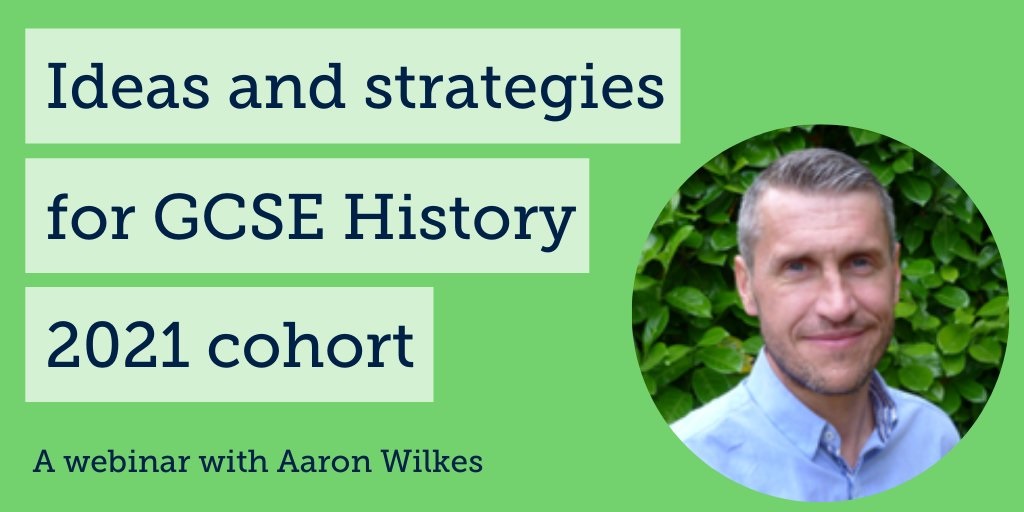Aaron Wilkes joined us for a webinar discussing how the lockdown has affected the teaching and learning of GCSE History, picking up on the themes of consolidation, challenges and change. During the webinar many teachers asked questions and shared some brilliant mnemonics they use in class to help knowledge retention. Watch the webinar recording for more.
Q: We’ve had really low student engagement. How do you suggest building student confidence back up?
Aaron’s answer: Ensure lessons are framed in an engaging way with good “hooks” and clever use of stimulus material and enquiry questions. Engaging lessons for pupils learning remotely is tricky – we often don’t know their situation or set-up at home. At my school, the pastoral network we have in place has been excellent and we’ve tried to ensure the online work we have done has been relevant and engaging too.
Q:What do you think of sentence starters to help low achievers?
Aaron’s answer: I’m in favour of using them and like the “I do, We do, You do” approach – gradually reducing the amount of support given to help students become more independent. I like the use of connectives for students to spot and use – so dotted around my room are words and phrases that help to add an idea (additionally, in addition, similarly) or show contrast (however, although, conversely).
Q: What would your thought-process be for deciding which unit to drop for the 2021 exams?
Aaron’s answer: It’s a tough question but I think we will drop the Period Study, mainly because we haven’t started it and traditionally our students do poorly on some elements of it e.g. the “convincing” question. My thought process reflects the students in front of me and the time we have left.
Q: We are looking at revising throughout Y11. What strategies would you suggest?
Aaron’s answer: I think we need to spend some time talking to our students about HOW and WHY to revise, as well as WHAT. Sometimes we concentrate on the content, rather than how to revise effectively. So I would spend some time on proper study skills – the really tried and tested ways we know work. For example you could set a mind map exercise on Nazi propaganda methods and ask them to do it from memory, explaining why they need to do it from memory talking about the exam and the power of recall. Make it clear WHY it’s important to do things in certain ways.
Memorable Mnemonics
Teachers shared some great mnemonics during this webinar. Here are some of our favourites:
- For source work: Arthur Aardvark Tickles Pigs = Author, Audience, Time, Place
- For Hitler’s consolidation of power: BRENDA! Becomes chancellor, Reichstag Fire, Enabling Act, Night of the Long Knives, Death of Hindenburg, Army Oath
- For Hitler as leader of Germany – 7 Ps of leadership = Policy, Party, Popularity, Prosperity, ‘pponents, Problem-solving, Propaganda
- For Elizabethan exploration: PASTIES = Privateer, Adventure, Slave Trade, Technology, Invasion of new lands, Economic, Ships
- Road to WW2: Roger Rabbit Always Sucks Carrots Politely = Rearmament, Rhineland, Anschluss, Sudetenland, Czechoslovakia, Poland
- Reasons for US boom/USA in 1920s: LACK PANTS = Laissez faire, Assembly lines, Credit, Knowledge, Position of USA after war, Advertising, New consumer goods, Tariffs, Stock Market
- Treaty of Versailles themes: LAMB = Land, Army, Money, Blame
- Causes of WW1: MANIA = Militarism, Alliances, Nationalism, Imperialism, Assassination

Aaron Wilkes is one of the leading history authors in school publishing as well as being a History teacher at St James Academy, Dudley. Aaron is the author of the new KS3 History 4th Edition series as well as part of our Oxford AQA GCSE History team.
Read more from Aaron Wilkes
✓Live Twitter Q&A takeover with Aaron Wilkes


